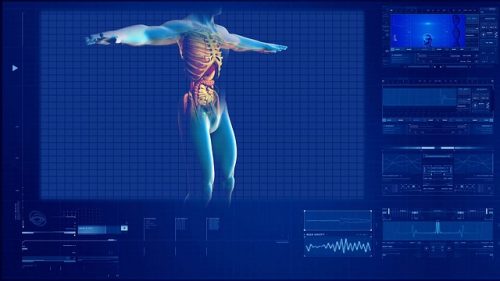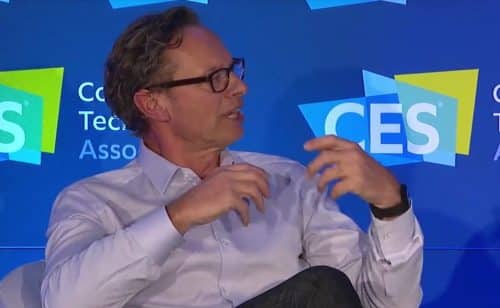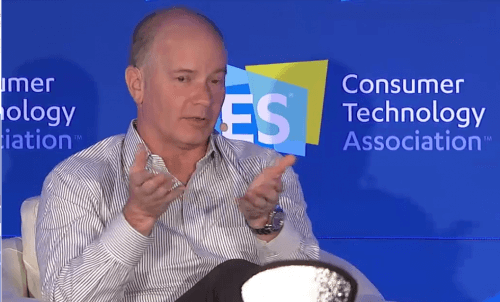This is what Jaron Tass, CEO of the Connected Medical Care Division, and Medical Information at Philips Company said * Chris O'Connor, Director of the Watson IOTBBM Division as part of a panel that dealt with the social implications of the artificial intelligence revolution as part of the CES-2017 conference
Artificial Intelligence, CES 2017
- No government in the developed countries is prepared for the robot revolution that will eliminate jobs throughout the organizational hierarchy
- "People are willing to tolerate the death of 35 people from vehicles driven by humans, but will not be able to tolerate one death from a robotic vehicle

Robots will improve the quality of medical care, already in the near future, said Jaron Tass, CEO of the Connected Medical Care Division, and Medical Information at Philips and Chris O'Connor, Director of the Watson IOT Division, on a panel that dealt with the social implications of the artificial intelligence revolution as part of the CES-2017 exhibition held at the beginning of January in Las Vegas. Moderated by David Kirkpatrick, CEO of TECHONOMY.
in the previous episode, yesterday, we reported to you about the impact of artificial intelligence on the labor market, but the same panel also dealt with another issue where the consensus is much more optimistic - that the use of artificial intelligence in health services may help with diagnoses, preventive treatments and also the medical treatments themselves and the contact between the doctor and the patient.
Tass: "Medicine is a complex field and depends on social, economic, educational factors, our relationship to the people around us, our mental state, and what lies in our DNA. So far we have dealt with specific aspects of health in order to help doctors digest the medical information. Today, there is a lot of information about each patient, but in order for it to be useful, you have to look at it from a holistic point of view.
In addition to the indicators that are still tested today: clinical information, physiological data such as blood pressure, heart rate and sugar level, the most important element in medicine is the context of who you are, and what is right for you. It will then be possible to get down to the resolution of smaller problems such as radiology.
"The radiologist uses pattern recognition. They look at the picture and apply their knowledge to decipher it.
If you look at a brain scan of multiple sclerosis patients, it looks like a star system so it is difficult to detect the changes from test to test. Also in the field of cancer we want to quantify the variability of the tumor over time. Looking at the visualization is not enough. We want to examine the cell structure and perform digital pathology. From which cells to extract the genomic sequence. The artificial intelligence helps us to give the most accurate treatment."
"This is a complicated task and I have not yet mentioned additional data such as symptoms, and data that we can retrieve from wearable devices. We reach a situation where the information is collected, the insights are extracted from it and put into context, as well as linking the result back to the body of knowledge. This task will become a big AI problem. It cannot be solved using the traditional statistical methods. It's about pattern recognition on a large scale. Normal technology has no chance of discovering this because most of the information is unstructured."
"We monitor the elderly in their homes. They make up five percent of the population, but cause 50% of the health system's costs. We discovered that if we monitor them, and stream data about their health from various devices and put it in the context of their profile, and we do this on a large scale, we can operate a control center where at any moment we see if someone's condition has changed and they need quick intervention. We no longer rely on the nurse's knowledge, but on the data and the data is very complex. Data from a camera, and from a number of sensors."
"We are aware that medicine is based on a personal relationship between the therapist and the patient, so when we developed the autonomous radiologist, we made sure that at the end of the process it would be the doctor who would approve or reject the recommendations of the robotic system." concludes Tass.

O'Connor: "We at IBM also deal with the complex issue of radiological data (and a significant part of this is done in the research laboratory in Haifa, see - The tireless radiologist assistant AB) Even the greatest expert cannot master this enormous amount of data. The artificial intelligence makes it possible to develop a virtual model of the photographed organ and to dive into the places that interest us. Radiologists now have a tool that helps them do their jobs better and increase the knowledge base of their specialty. Because although each patient is individual, it is important to store information on all patients in order to generate data about the disease and use it to study the system to make it easier for it to identify specific patterns next time."
"We entered a data system of over 200 million medical records in the US alone. True, we have duplicates, but this data will allow us to locate specific patients with similar characteristics and treat them. Indeed, the field of oncology is a field worth starting in."

And Akunor adds: "The world is increasingly based on multiple sensors. This is an excellent opportunity to advance artificial intelligence and put it into the sensors themselves. And also to gather the data and find patterns, statistics, etc. These things will not be carried out by a few companies but through an entire ecosystem of solution providers for many tasks in our lives in areas such as health, manufacturing, vehicles, oil production. All these fields and many others create a lot of data (big data) but also an opportunity to provide intelligent data but also to add sensing ability to it (cognition).
"We at IBM have developed systems for 18 different industries starting from the financial sector, to efficient production and of course in the field of medicine. It's starting to be a competitive environment. We already see here (CES) consumer product companies that integrate artificial intelligence into their products for the smart home, the smart car and more."
Computer vision is an important component of the cognitive age
